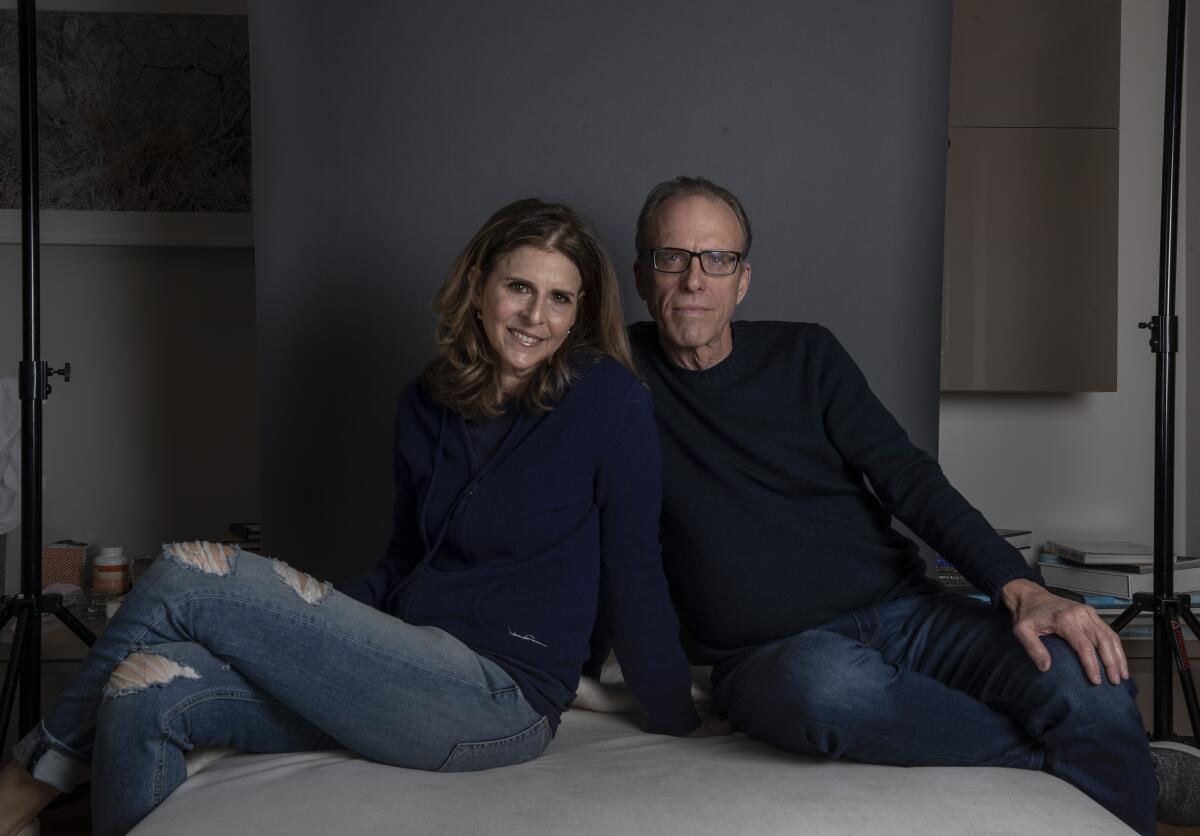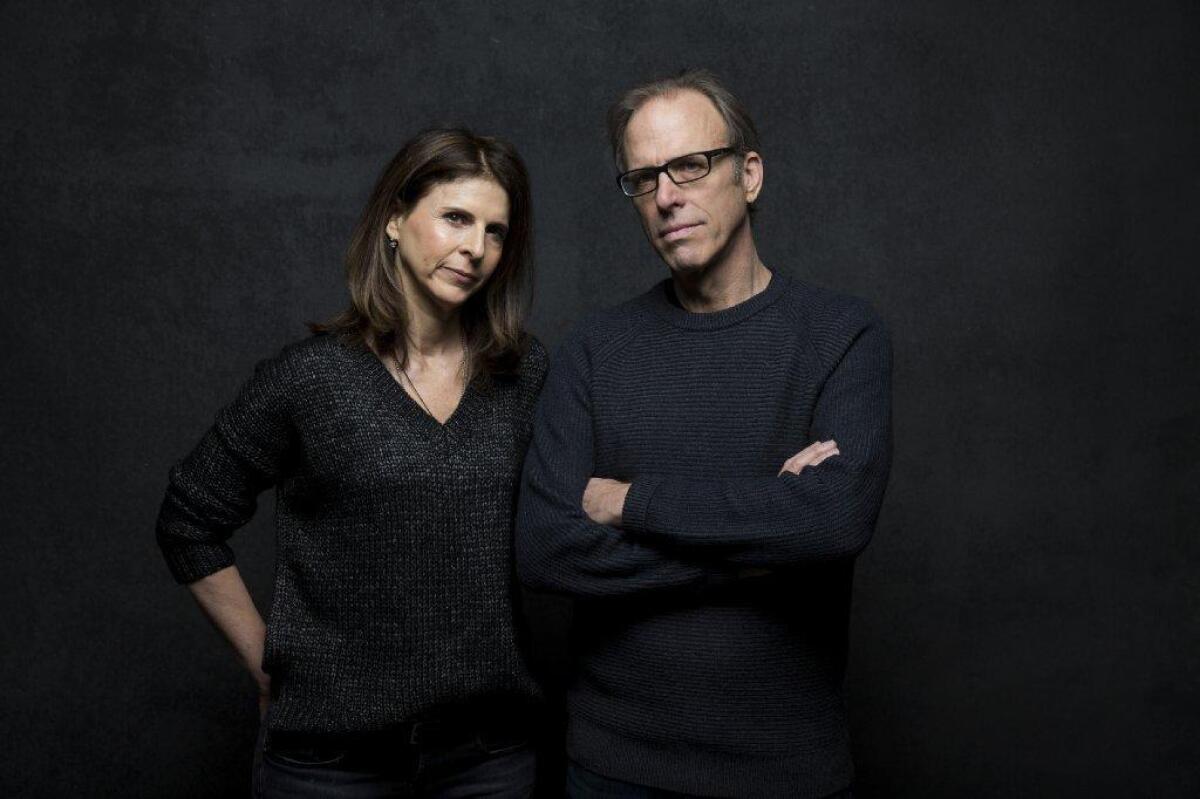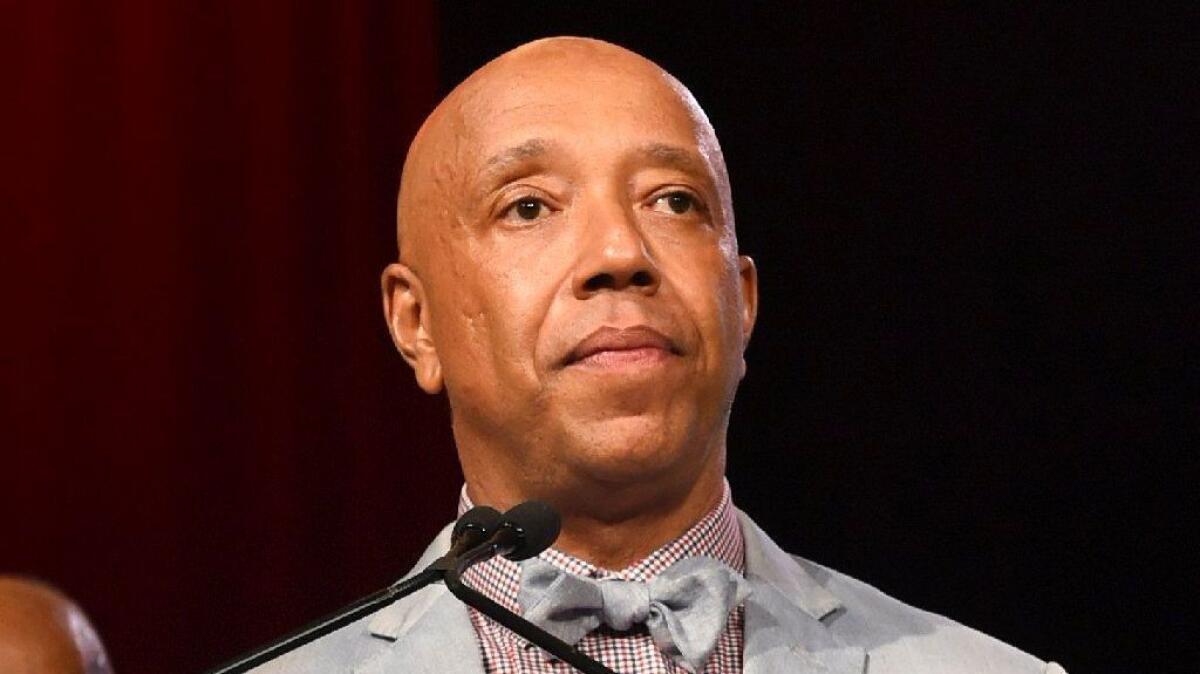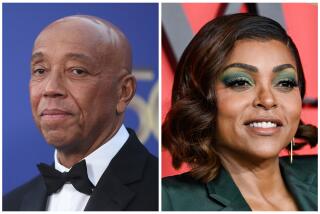Oprah Winfrey backed out of the Russell Simmons sexual assault documentary. Why the fallout was ‘horrible’

- Share via
Twenty minutes. That’s how long Kirby Dick and Amy Ziering had to digest the news that Oprah Winfrey was pulling her support of their documentary before she released the announcement to the press.
The email from Winfrey, sent at 3:10 p.m. on Jan. 10, had come as a shock. In her message, the filmmakers said, the Harpo Productions head said she would no longer be serving as the executive producer of their documentary, “On the Record,” about the survivors of Russell Simmons’ alleged sexual abuse. Subsequently, the movie — set to premiere at the 2020 Sundance Film Festival — was dropped from a planned release on Apple TV+ through Winfrey’s deal with the streaming platform.
“In my opinion, there is more work to be done on the film to illuminate the full scope of what the victims endured and it has become clear that the filmmakers and I are not aligned in that creative vision,” Winfrey said in her 3:30 p.m. statement, in which she also made it clear she “unequivocally” believes and supports the film’s subjects. “Kirby Dick and Amy Ziering are talented filmmakers. I have great respect for their mission but given the filmmakers’ desire to premiere the film at the Sundance Film Festival before I believe it is complete, I feel it’s best to step aside.”
Dick and Ziering, who have collaborated on six nonfiction films together, had never been under the impression that Winfrey had serious concerns about the documentary. On the contrary: Ever since they first met with her in New York in January 2019, they said, she had been effusive in her praise of the project.
“She loved, loved, loved what we did,” recalled Ziering, sitting in her Brentwood home alongside Dick, her filmmaking partner, earlier this week. “And then she saw it numerous times throughout the editing process. We had a very close working relationship and very, very positive — enthusiastically positive. There weren’t any issues.”
Winfrey announced a collaboration with Dick and Ziering — then called “Toxic Labor” — at Apple TV’s first media presentation in Cupertino, Calif., on March 25. Apple, which also did not respond to The Times’ inquiries, subsequently wrote the application submitting the movie to Sundance in October, the filmmakers said. It was accepted to the festival, and in November, Ziering and Dick locked picture. On Dec. 3 — a day before the Sundance lineup was released — Harpo and Apple put out their own announcement touting the collaboration.
“Apple was busy booking us rooms and flights,” Ziering said. “There was no intonation of any problems whatsoever.”
Online, however, backlash was brewing. On Dec. 12, rapper 50 Cent posted a picture of a smiling Winfrey and Simmons together on his Instagram account, accompanied by a caption questioning “why Oprah is going after black men” instead of Harvey Weinstein or Jeffrey Epstein. He alluded to the fact that Winfrey had also supported two alleged survivors of Michael Jackson’s sexual abuse who appeared in the HBO documentary “Leaving Neverland.” After that film aired in March 2019, Winfrey sat down with the subjects, Wade Robson and James Safechuck, for an interview special. She has since said that never before in her career had one of her interviews sparked such “hateration.”
Simmons, meanwhile, voiced his own disappointment with Winfrey on Dec. 13. In a letter addressed to her, the disgraced former R&B mogul said he found it “troubling” that she had chosen him to “single out” in the project. The filmmakers were not concerned by the post: “That’s accused predator playbook 2.0,” Ziering said.
Winfrey did not respond to The Times request for comment for this story, but subsequently told the New York Times that Simmons repeatedly appealed to her to distance herself from the project. She contends, however, that she left the project over creative concerns including how the film presents and contextualizes the accusations against Simmons.
A few days after Simmons’ letter went public, the directors received a new round of notes from Harpo, and Winfrey suggested the film might not be ready for Sundance. The suggestions they’d received from the production company up to this point, they said, had been “wonderful” and “acute” — mostly small things such as “We don’t like the way this scene transitions” or “Can we build out this scene because we want more of this character,” Dick explained.

Receiving the notes after picture lock was startling to the filmmakers, but they were not alarmed. “We felt like we could address them,” Dick said. “We didn’t really feel like the film needed them, because the film was already good, but as good partners, we wanted to honor the relationship and just keep moving forward. So what we had to do was cancel a lot of holiday plans, but we have a great staff and we pushed forward and we got it out.”
The directors urged Harpo to move ahead with the Sundance release, arguing that it could be traumatizing for the alleged survivors featured in the documentary to change the distribution path once it had already been announced. And more changes could be made to the film post-Sundance — a common scenario for movies that debut at the annual January festival.
“Much as we wanted [Winfrey] to be happy and keep up the amazing relationship we had — and as much as we really do totally respect her vision — we felt and argued that we couldn’t blink,” Ziering recalled. “People would say that there’s a problem. If she didn’t want to go to Sundance or there was a change of heart about the distribution plan, the time for that had passed.”
When Winfrey’s Jan. 10 statement went wide, the filmmakers immediately reached out to the women in the movie — Simmons’ accusers including Drew Dixon, Sil Lai Abrams, Sheri Hines and Alexia Norton Jones — to check in.
“I felt horrible that we didn’t have more advance time to set them up and warn them,” Ziering said, her eyes filling with tears. “That’s a shock wave. It was horrible. It’s been horrible.”
The Simmons documentary is the fourth that Ziering and Dick have tackled on the subject of sexual abuse. They have explored the issue in the church (“Twist of Faith”), on college campuses (“The Hunting Ground”) and in the military (“The Invisible War,” nominated for best documentary at the 2013 Oscars). For years, they said, they had wanted to delve into sexual harassment in Hollywood and had spoken with Weinstein’s alleged survivors prior to fall 2017, when claims of his predatory behavior first surfaced in the New York Times. (The Weinstein Co.’s RADiUS-TWC division released “The Hunting Ground.”)
“We had gone to several distributors and did not get funding, not surprisingly,” Dick said of the pair’s pre-#MeToo efforts. But as soon as an avalanche of serious accusations involving powerful entertainment industry figures began to pour out in late 2017, Dick and Ziering were able to secure financing from Impact Partners, the company behind documentaries including Academy Award winners “The Cove” and “Icarus.”
At first, Dick and Ziering cast a wide net — reaching out to victims, executives and even this reporter about appearing in the film. Through a mutual filmmaker friend, they were connected with Drew Dixon, who told them that Simmons had raped her in his Manhattan apartment while she was working as a 24-year-old executive assistant at Def Jam Recordings in 1995.
At the time, the Los Angeles Times had yet to publish the first public accusations against Simmons. That came on Nov. 19, 2017, when Keri Claussen Khalighi told the paper that in 1991, when she was a 17-year-old model, Simmons had forced her to perform oral sex on him and then penetrated her from behind while she was showering. Since then, an additional 19 women — including Dixon, who spoke out in a Dec. 13, 2017, New York Times article — have alleged that Simmons was sexually inappropriate with them. He has vehemently denied all the claims, describing himself as a reformed “womanizer” who has “never been violent or forced myself on anyone.”
As Dixon was wrestling with whether to speak publicly, the filmmakers were trailing her with cameras.
“We told her: ‘No one has ever seen the inside of what it is when someone grapples with that decision,’” said Ziering. “‘Do you mind if we follow your journey? And no harm, no foul. You can stop us anytime. You can tell us to go away. We’re survivor-focused, survivor-first, so I don’t want you to feel any emotional pressure, and if after six months you tell us you don’t want us to use the footage, we’re totally fine.’ And I meant that. I always say that to anybody we talk to.”
Ultimately, they decided to focus their first MeToo project — they have several more in the pipeline — on Dixon and the plight of African American women who decide to speak out about sexual abuse.
“No one wants to compare the parade of horribles, but what we ... find revelatory is the unique bind that women of color find themselves in,” Ziering said. “As Drew points out, sexual assault is sort of baked into the DNA of our country. Women of color came to our country as property and they could be assaulted and they had no recourse to any kind of system of justice. That’s their legacy of their trauma. So a couple centuries later, here we are, and it hasn’t shifted where they feel like the police necessarily take their claims with the same legitimacy [of] a person [that] society privileges.
“And you have the second hurdle of — because of our culture’s incredible history of racism and because the ground zero for many racist tropes is ‘a black man is a predator or rapist or some kind of criminal’ — do they really want to come forward and pile onto the burden that all black men feel when they walk down the street in America? And then ... when they do come forward, the black community is very torn and divided, because you gotta circle the wagons.”

Dick and Ziering acknowledged that some of the film’s subjects initially had an issue with the fact that two white directors wanted to tell their story.
“I owned it,” Ziering said. “I said, ‘Well, yeah. Let’s talk about it.’”
Some of those conversations — held on and off camera — were included in earlier incarnations of the film but ultimately were excluded because the filmmakers did not want to draw focus to themselves.
“But it was a playing out of the very problem that the film was investigating,” Ziering said. “Do you go out to the white community and share your burden, and do you trust the white community to take care of your burden with the care, sensitivity, intelligence and empathy and with the moral rectitude that it deserves?”
Through the Time’s Up Legal Defense Fund, which is handling press for some of Simmons’ alleged survivors, Dixon and the other women in the film declined to be interviewed for this story. But on her Twitter account, Dixon has insinuated that Winfrey’s removal from the project left her feeling disappointed. In a since-deleted Jan. 10 tweet, she wrote to her followers: “Thank you for your support. With love from under the bus.”
As for the filmmakers, they’re still licking their wounds. But they’re also looking forward to the Jan. 25 Sundance premiere, where they will be seeking a new distribution partner.
“We wish we were going with Apple and Ms. Winfrey. I mean, we do. But it’s bigger than those two, really,” Dick said. “We feel the film is completely solid, addresses everything very powerfully. We know that it does because the responses of hundreds of people from all walks of life have been so glowing and enthusiastic. We stand by the film, we stand by the survivors’ stories completely, we know that the veracity is completely locked down. We think the film is strong and we are very hopeful that audiences at Sundance will feel the same.”
More to Read
Only good movies
Get the Indie Focus newsletter, Mark Olsen's weekly guide to the world of cinema.
You may occasionally receive promotional content from the Los Angeles Times.










